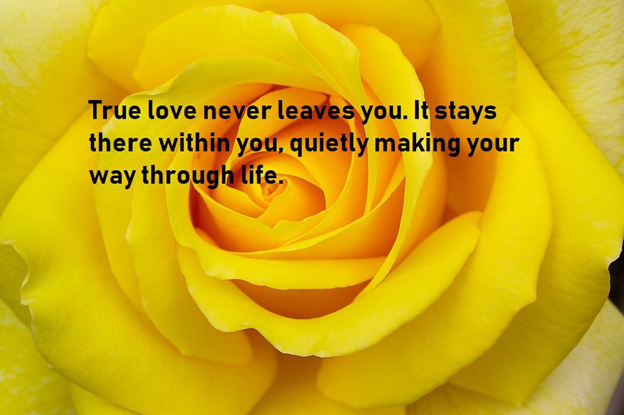.
Throughout history, people have argued about what constitutes true love and what isn’t. Cynics frequently assert that it does not exist, whereas hopeless romantics believe that everyone should embark on a quest to find their soulmates. With science now demonstrating that true love is not only possible, but can also last a lifetime, we’ve decided to investigate the psychological factors that influence whether or not love blooms.

Let us begin by defining what true love is in its purest form:
WHAT EXACTLY IS TRUE LOVE?
True love: what it is and what it isn’t, according to experts. Do you have any idea? I can picture the day clearly in my mind’s eye. a limo pulling up to take him and me to the airport, white clusters of flowers on the pews, tears in my mother’s eyes, lavender chiffon bridesmaids… the list goes on and on.
All of the specifics of my wedding day are planned out in my head at this point. All of them, with the exception of the bride and groom. Oops. That’s a critical component, isn’t it? Love. Four-letter words are frequently used in casual conversation. “Macaroni and cheese is one of my favourite comfort foods.” “I really enjoy their music.” We may even express our feelings by saying, “I love him” or “I love her.”
WHAT EXACTLY IS REAL LOVE?
Does it have anything to do with the pounding heartbeat you get when you see… You’re probably familiar with the individual I’m referring to. That hot guy who’s playing basketball at the gym a few doors down… the cute girl who smiles and makes eye contact with you as she walks by… Someone’s friend of a friend of a friend… or even a best friend. It’s that person who we keep track of whenever he or she enters the room, whose comments and actions we scrutinise to the exclusion of all else. Nevertheless, is that love, or just the beginning of it? There are a couple of things that love isn’t. Love is not a feeling at all. Although real love is frequently accompanied by intense emotions, it is not synonymous with the sensation of floating on clouds. Affectionate people do not always feel warm and fuzzy when they are around each other, contrary to what is depicted on screen, in music, or in movies.
It is extremely important to understand the personality and character of the individual.
On the basis of emotions, a relationship would not last long. In reality, knowledge is the foundation of any successful relationship.
Knowing something about the other person is essential. Whether it’s a movie star from the latest romantic drama or the guy sitting behind me in calculus class, I used to, and occasionally still do, “fall in love” with men with whom I’ve never had a conversation. I would be familiar with his name and face, but that would be the extent of my knowledge of him. Who knows where we would end up if I started a relationship with him!? It is extremely important to understand the personality and character of the individual. One good test is to make a list of the characteristics that we find attractive in a particular guy or girl. If the list is lengthy, it indicates that we are knowledgeable about and interested in those topics. If the list is short, it means that we either don’t know much about them or that we know a lot about them but aren’t attracted to their personality.
Common life Objectives.
Another important factor in a successful love relationship is the presence of common life objectives. If we want to have a long-term relationship, we need to be heading in the same general direction as the other person. If his ambition is to travel the world as an international businessman and hers is to work as a realtor in a single location, there may be a misunderstanding. The direction of the couple’s lives may be in serious jeopardy if she prefers to live in the countryside surrounded by nature and he prefers to live in the hustle and bustle of a big city.

True Love is not the same as sex. That statement alone is in direct opposition to much of what we are fed by the entertainment industry. In popular culture, whenever two people get together, they have sex. Without depicting some of the unpleasant realities of premarital and extramarital sex, it is depicted as a wonderful, enjoyable, and recreational activity for both parties involved.
Sex is intended for marriage, which is a long-term commitment between a man and a woman. Having sex outside of marriage can have serious ramifications. It is possible to experience pregnancy, sexually transmitted diseases, guilt, insecurity, and shame as a result. A lust-based relationship can only last as long as the two people involved are physically close to each other and find each other sexually attractive.
Love Is A Choice, Not A Necessity. It Is A Commitment
Love will be accompanied by feelings, and marriage will include sex, but these things will not be the foundation of a long-lasting, healthy relationship. The decision to be in love every day, no matter how we are feeling, is the solid foundation of any love relationship. It is a choice to put the other’s interests ahead of our own and to work past the inevitable hurts and disagreements that will occur when two different personalities become intimately involved with one another. It is important to protect and nurture your relationship as you face the world together, hand in hand.
God, according to the Bible, is love. That, in his capacity as our designer and creator, he created us with a need for affection. Do you ever wonder why we are constantly on the lookout for love from others, but never seem to be completely satisfied with what we receive? The reason for this is that God created us to be dependent on unconditional love, and we, as individuals, are flawed.
Every person, whether it’s a friend, a family member, or your significant other, will unavoidably disappoint you at some point. God desires for us to place our primary reliance on him for our needs of unconditional love and acceptance. If someone is funny or thoughtful, it is impossible for them to meet all of our needs in one person. Read A Conversation about Love and God or Picture Perfect if you want to learn more about experiencing God’s unconditional love for yourself.
TRUE LOVE : Is it true love or just infatuation, and how do you know?
Check to see if you’ve got the real deal or not. Try out our “True Love 101” mini-course to learn more about true love. It’s similar to putting your relationship through a love litmus test.
Infatuation can be extremely seductive. Do I, on the other hand, wish to be in a long-term, satisfying relationship? If this is the case, infatuation is not the solution. Examine your interpersonal relationships using the grid provided below. Infatuation isn’t necessarily a bad thing, as long as we don’t use it as the basis for a long-term relationship.
INFATUATION TRAITS
- Considers the other person to be faultless
- Selfishly desires to have his or her own needs met.
- Spends the majority of his or her time with the other person
- Easily “falls” in love with the other person.
- Other interpersonal relationships and friendships suffer as a result.I
- Jealousy is frequently triggered by a person’s reliance on another.
- It only lasts for a brief period of time.
- Distance puts a strain on a relationship, and it is frequently the cause of its dissolution.
- Quarrels are serious and occur frequently.
- Disagreements can have a negative impact on a relationship.
LOVE TRAITS
- Despite the other person’s flaws, the person still loves them.
- Selfless in his desire to serve the other person.
- He continues to spend time with others.
- It takes time to establish a working relationship.
- Other interpersonal relationships and friendships become more solid.
- Jealousy is less severe and occurs less frequently when there is trust and understanding.
- Involves a commitment to a long-term goal
- Because of the distance, it survives and is sometimes even strengthened.
- Quarrels are becoming less serious and occurring less frequently.
- Disagreements can actually help to strengthen a relationship.
As Dr Lisa Firestone, author of Sex and Love in Intimate Relationships, frequently states, “The most effective way to think of love is as a verb.” When it comes to love, action is required in order for it to flourish. According to Dr Firestone, “We spend a lot of our time worrying about how our partner feels about us or how the relationship appears from the outside.” Despite the fact that it feels good to be loved by someone else, each of us can only truly feel our own loving feelings for another person and not the feelings of that person for us. It is necessary to take loving actions in order to connect with and maintain those loving feelings that exist within ourselves. Otherwise, we might as well be living in a dream.”

Even though it can be frustrating at times, accepting the fact that the only person we have any true control over in a relationship is ourselves can actually be quite empowering. As a team, we are responsible for one-half of the dynamic.
As a result, we have the option of deciding whether to engage in behaviours that are harmful to intimacy or whether to take actions that express feelings of love, compassion, affection, respect, and kindness to another person. In order to consciously and consistently choose the latter, it is beneficial to consider the characteristics that Dr. Robert and Lisa Firestone discovered to be essential to maintaining a truly loving relationship over the course of more than 30 years of research.
Characteristics of a True Love Relationship versus a Fantasy Relationship
1. When it comes to feedback, non-defensiveness and openness are preferred over angry reactions.
A loving relationship should have the following characteristics: couples should be open with each other, which means they should be willing to hear feedback from each other without being defensive or discouraging. In her advice to couples, Dr. Lisa Firestone advises them to look for the kernel of truth in whatever their partner is saying. That truth can provide an important clue into the ways in which we may unwittingly push our partner away without realising we are doing so. Even if we don’t agree with everything our partner says, simply listening to them makes them feel seen, heard, and cared about in a natural way. Punishing our partner for being honest and direct with us, on the other hand, has the effect of shutting down communication.
2. The difference between being open to new experiences and being closed to new experiences
When both people are in touch with a lively, open, and vulnerable side of themselves that welcomes new experiences, a relationship can flourish. Even if we don’t agree with and participate in everything our partner enjoys, engaging in new activities, travelling to new locations, and breaking routines can often invigorate a relationship and make it feel more alive for both people.
3. Deception and duplicity are pitted against honesty and integrity.
One of the first lessons most of us learn as children is the importance of telling the truth. However, even in our closest relationships as adults, there can be a great deal of deception. When we are dishonest with our partner, we are doing a great disservice to them, the relationship, and ourselves as well. If we want to feel vulnerable with our partner, we must first trust them, and trust can only be earned through openness and honesty.
4. Respect for the other’s boundaries, priorities, and goals as opposed to crossing lines and going too far.
In order to avoid forming a fantasy bond with the other person, we must see them as distinct from ourselves. That entails treating them as if they are a distinct and autonomous individual. Couples are prone to adopting roles or playing into power dynamics on a regular basis. We may instruct one another on what to do or how to behave. Alternatively, we may speak for and about one another in ways that are constricting or limiting. They are treated primarily as extensions of ourselves rather than as distinct human beings. As a result, our own attraction to them is reduced as a result of this. According to Dr. Lisa Firestone, “we treat the other person as if they were our right arm.” If that is the case, we are no more attracted to them than we are to our right arm.”
5. Physical affection and personal sexuality as opposed to a lack of affection and inadequate, impersonal, or routine sexuality are two extremes in this comparison.
how to find loveAffection is a significant component of our ability to express love. It is natural for a relationship to become stale when we isolate ourselves from our feelings of affection. Because of this, the spark between us and our partner is diminished. Sexuality can become routine or impersonal, causing both partners to feel more distant and unsatisfied as a result of the change. Love must be maintained by maintaining contact with that part of ourselves who desires physical contact and is willing to give and receive affection.

6. Understanding as opposed to misinterpretation
Projecting onto our partner or misinterpreting what they are saying is easy, and we can use them to feel hurt or attacked in ways that are familiar to us and that we have experienced in the past. In addition, it is easy to become entrapped in our own point of view, failing to see things from the other person’s perspective. We will always be two different people with two different sovereign minds, and as a result, we will never always agree on everything. However, it is critical that we make a genuine effort to comprehend our partner’s point of view from an objective standpoint. It is much more likely for our partner to soften and see our point of view if they feel seen and understood by us and vice versa.
7. Noncontrolling, non manipulative, and nonthreatening behaviours as opposed to manipulations of dominance and submission are contrasted.
In many cases, couples find themselves caught in a cycle where one partner acts like a parent and the other acts like a child. the-fantasy-bondWhen one person looks to the other for guidance, the other person becomes resentful of the person who tells them what to do. Alternatively, one person attempts to exert control over the situation and then complains that the other person is irresponsible, immature, or passive in their response. For a relationship to be truly loving, both partners must be on an equal footing. It is impossible to have an adult, equal, and loving relationship when one partner attempts to control and manipulate the other. This can be accomplished through yelling and screaming or stonewalling and playing the victim.
Learn more about the fantasy bond in PsychAlive’s eCourse, The Fantasy Bond: The Key to Understanding Ourselves and Our Relationships, which is available for free download here.
How to Have a Loving Relationship with Someone You Deserve
We now understand the characteristics of true love; how can we use this knowledge to make ourselves and others more loving in our relationships? In the first place, it’s important to recognise that, despite the obvious differences between real love and fantasy, many people confuse the two concepts. Even worse, they may prefer fantasy to reality because it is less painful for them to appear connected to someone rather than actually feeling connected to someone.
Many of us become enthralled by the fairy tale, the superficial elements, or the structure of the romantic relationship (i.e. how it looks as opposed to how it feels). We may fall in love with the illusion of connection or security that the situation provides, but we must be careful not to become overly attached to the other person in the process. This is due to the fact that, while most of us believe we want love, we frequently act in ways that repel it from us. Therefore, the first step toward becoming more loving is to become acquainted with and challenge our own defensive mechanisms.
Taking on the defences that stand in the way of true love
Many people have irrational fears of intimacy that they are completely unaware of. When it comes to fantasy, we may be tolerant of having our dreams of falling in love come true, but when it comes to reality, we are often unwilling to accept that dream being fulfilled. Dr. Robert Firestone explains how being loved by someone can put our defences in jeopardy and reawaken emotional pain and anxiety that we experienced as children. As a result, he believes that both giving and receiving love have the potential to disrupt the negative but familiar ways in which we think about ourselves. “On an unconscious level, we may believe that if we do not push love away, the entire world as we have known it will be shattered, and we will no longer know who we are.”
As a result, we are frequently the most significant impediment to establishing and maintaining a loving relationship. We must become more aware of the defences we bring to the table that prevent us from receiving love. Example: If we were raised to be afraid of being rejected, we may be fearful of becoming too close to another person. As a result of not feeling like we can truly rely on or trust a partner, we may either cling to that person or ward him or her off, both of which have the same result of creating distance between the two of us.

If we were criticised or resented as children, it is possible that we will struggle to feel confident and worthwhile in our adult relationships. As a result of this early self-perception, we may seek out partners who put us down in ways that feel familiar to us, or we may never fully accept our partners’ feelings for us because they threaten this early sense of self.
Depending on how we were raised and whether we had a “emotionally hungry” parent, we may choose to avoid intimacy together and feel pseudo independent, or we may subconsciously seek out people who rely on us to meet all of their needs and more. Again, either of these extremes can result in a lack of genuine closeness and intimacy in a couple’s relationship.
Know your Defenses
The good news is that by getting to know ourselves and our defences, we can begin to break these destructive relationship patterns. What factors influence our decision on which partners to work with? What are the characteristics that we are drawn to – both good and bad? Does our partner act in a way that is consistent with our defences because we have distorted or provoked them to do so? How do we establish a sense of distance between ourselves? Is it possible to identify behaviours that we engage in that may appear to be self-protective, but are actually designed to repel love?
Difficulty in challenging old, ingrained patterns and defences is something Dr. Robert Firestone has further developed, and he refers to this as the process of differentiation. There are four steps in this procedure:
Distinguish yourself from the critical, punishing, and destructive attitudes that you acquired early in life.
Distinguish between undesirable characteristics in your parents that you observe in yourself.
Make a conscious effort to challenge the defensive reactions you had as a child that are no longer useful to you in the present.
Developing your own set of values and learning to live by them – who do you want to become?
Taking these steps toward differentiation allows us to live in a less defended state, which allows us to pursue the things in life that we truly desire.
How to Make True Love Last a Long Time
Understanding how and why we form a fantasy bond can provide many answers to the question of why love eventually fades. When it comes to protecting oneself from love, the fantasy bond is unsurpassed. Despite the fact that we’ve let down our guard and allowed ourselves to fall in love, the moment we’re afraid of something, whether it’s losing our partner or changing from our old, familiar identity, we may turn to a fantasy bond to keep the illusion that we’re not alone while maintaining emotional distance from our partner. We should avoid the characteristics listed above, as well as the actions listed below, in order to avoid forming a fantasy bond.
Actions to take in order to break a fantasy bond and become more loving include:
Be affectionate with others. Find even the tiniest ways to connect with someone and to express affection and attraction.
Slow down and pay attention to the present moment. Make the time to truly communicate with and listen to your partner.
Make direct eye contact with the other person. It may seem obvious, but we frequently forget to simply look at our partner.
Try something a little more traditional. Make time for each other and don’t stop doing the things you used to enjoy doing together.
Experiment with something new. Don’t just go through the motions. Continue to suggest new activities and remain open to suggestions from your partner.
Break away from the routine. Consider whether your routine is killing your excitement and whether you should consider breaking the habit and making room for spontaneity.
Passivity and control should be avoided. Make every effort to ensure an equal exchange of ideas. Take full responsibility for your own actions and refrain from attempting to exert control over your partner.
Instead of using the pronoun “we,” use the pronoun I.
” Keep in mind that you will always be two distinct individuals and that crossing boundaries will reduce your attraction to one another.
Keep an eye out for your critical internal voice. All of us have an inner adversary who criticises ourselves and our partner and works to undermine our most intimate relationships.
Carry out an independent action. The fact that you’re in a relationship does not imply that you must do everything together. Avoid giving up friendships and activities that you enjoy on your own, and don’t ask your partner to do so either.
Communicate how you are feeling. Don’t expect your partner to be able to read your thoughts. Saying what you want and how you feel directly helps you avoid using passive-aggressive or nasty communication techniques. It also serves to encourage your partner to do the same thing as well.
Stay away from the “tit for tat” mentality
The act of loving someone is something each of us must decide for ourselves. When we start comparing and contrasting what we do for one another, we set unrealistic expectations and foster resentment instead of staying in touch with how good it feels to be loving toward another individual.

Encourage your partner to participate in activities
Encourage your partner to participate in activities that make him or her happy. If you want your partner to be the most alive he or she needs to do the things that make him or her feel most like himself or herself… even if those things aren’t what matters most to you — never stop supporting and encouraging him or her.
Take actions that your partner would interpret as loving on your behalf. Make certain that the things you do are things that are important to your partner specifically. Although you may enjoy receiving flowers, is this something that would make your partner feel loved as well?
Don’t let yourself become closed off. The temptation to close down whenever we are embarrassed, anxious, disappointed, or triggered by our partner is all too tempting. However, it is essential that we do not close ourselves off and push away the love that is directed toward us.
Note: Contact our Writers at www.eastsidewriters.com for writing Blogs/Articles on any niche. We have experts in various domains from Technology to Finance and from Spirituality to Lifestyle and Entertainment.







Pingback: True Love In Its Purest Form Is a Never Ending Bond Of Friendship
Pingback: 12 benefits children should grow along with dogs. - Eastside Writers
Pingback: The Cosmic Connection Between You And Your Soulmate - Eastside Writers
Pingback: The Essentiality Of Kamasutra In Our Lives. - Eastside Writers
Pingback: Men Look For Sensuous Beauty In Women Of 2023 - Eastside Writers
Pingback: Secret Benefit Of The Lipstick That You Wear In 2023 - Eastside Writers
Pingback: Female Body As Desired by Men: Women Flaunt, Men Admire - Eastside Writers
Pingback: Check Your Zodiac Pair Before Tying The Nuptial Knots For Marriage Success - Eastside Writers
Pingback: Can Money Buy Everything, From Peace To Happiness, Including My Dreams? - Eastside Writers
Pingback: Navigating the Unspoken: Understanding the Severity of Urinary Incontinence in Men - Eastside Writers
Pingback: The Myth of Asexuality in Success: Debunking the Notion that Career-oriented Individuals Lack Sexual Interest - Eastside Writers
Pingback: Embracing Diversity: The Unfortunate Stigma of Being Gay and Surrounding LGBTQ+ Identities - Eastside Writers